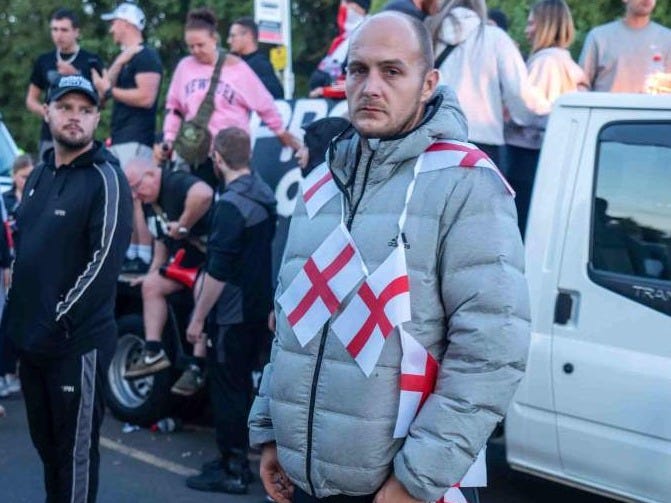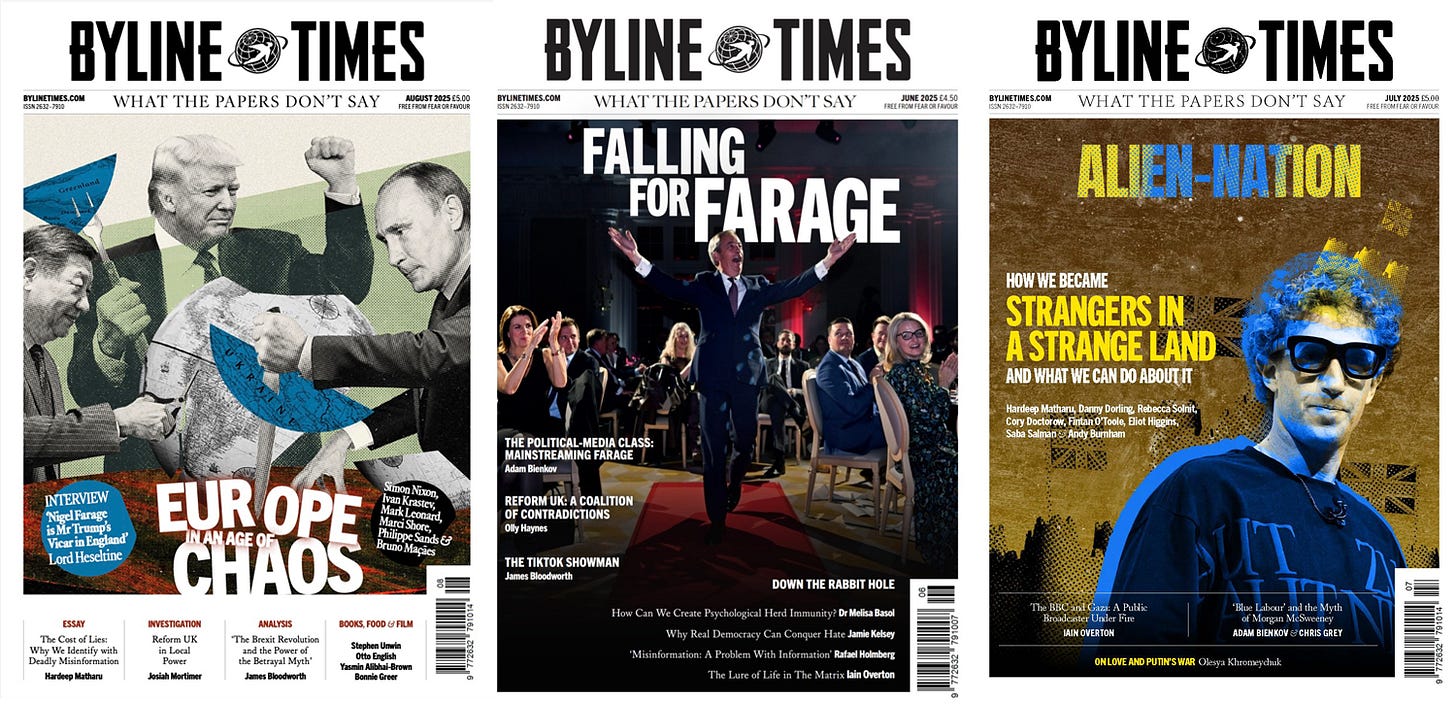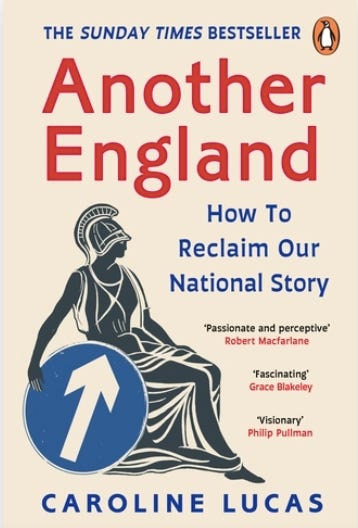Why We Need to Talk About Englishness
English identity is not something to be afraid of or suppressed within the notion of ‘Britain’ – but to be valued and explored, writes Caroline Lucas

Patriotism, according to the musician Billy Bragg, can essentially be understood as giving a shit about your country. Not thinking it is better than every other country. Not Boris Johnson’s ‘world-beating’ nonsense. Or Nigel Farage’s Union Jack socks. But a love of country that is inclusive and multi layered – and perfectly compatible with a deep desire to make it better
It is not using flags to intimidate your neighbours. And it is definitely not standing outside asylum hotels shouting at the terrified inmates to go home.
The wonder is that the Labour leadership should have any difficulty articulating this. Yet, it does.
Despite its increasing tendency never to appear before an audience without at least one Union Jack flag prominently displayed behind one of its members, the Government is surprisingly reticent about entering into the conversation about what a progressive patriotism might look like – and positively paralysed by the St George’s flag.
Keir Starmer and his colleagues appear to be afraid of English consciousness – as if the people of England cannot be trusted to have national pride and the cross of St George is little better than the hammer-and-sickle or the swastika.
But English identity does not belong to racists or extremists.
Neo-Nazis do not own the English flag just because they wave it over their heads at a far-right rally, any more than Oswald Mosley represented ‘Britain’ because he flew the Union Jack over his fascist rallies in the 1930s.
This case would be easier to make if the left had not so abjectly failed to offer its own alternative vision of what Englishness means.
If progressives cede this ground, deciding that it is too difficult to navigate – and remaining squeamish about even talking about Englishness – we can hardly be surprised if a regressive, inward-looking narrative fills the vacuum.
As a result, the populist far-right have hijacked Englishness with narratives of exclusion, exceptionalism, and imperial nostalgia – while the progressives haven’t even got onto the pitch. This could hardly be more dangerous.
If progressives do not try to define an inclusive sense of English identity, then we leave it to the fascist right and the racists to determine who does and does not belong.
The political right has always known what a potent force culture can be, selling a brand of Englishness steeped in reactionary isolationism that culminated in the Brexit vote in June 2016. As Anthony Barnett warns in his brilliant book The Lure of Greatness, “one reason the right won such dramatic successes in 2016 in England is that their opponents on the left fled the field of meaning and identity”.
To see off the growing threat of the populist right, then, the answer is not to try to out-perform Reform UK with ever more draconian policies on immigration and asylum – it is to tell more compelling stories about who we are and who we could be.
All politics is a battle of stories – the tragedy is that, at the moment, the Government is not even trying to tell one. But, if we care to look for them, there are plenty of compelling stories of England and Englishness, as I set out in my recent book, Another England: How to Reclaim our National Story.
Let’s celebrate the Chartists, one of the first working-class movements in the world, led by the English to demand democratic reform.
Or the Charter of the Forests from 1217, often seen as the first environmental charter forced on any government, which contained some of the most radical commitments on access rights to the commons to have been agreed.
When right-wing agitators delight in using wartime myths of a plucky little country standing alone, with the imagery of the white cliffs of Dover as a backdrop – to promote hostility towards foreigners, notably refugees – let’s point out that one in 10 RAF pilots in the Battle of Britain were in fact refugees from occupied Europe.
This does not mean airbrushing our imperial past: to the contrary, it means having a long overdue reckoning with it. As Empireland author Sathnam Sanghera has written, “if we don’t confront the reality of what happened in the British Empire, we will never be able to work out who we are or who we want to be”.
English identity does not belong to racists or extremists … This case would be easier to make if the left had not so abjectly failed to offer its own alternative vision of what Englishness means
As well as coming to terms with the realities of our colonial past, we also need a national conversation about our future: what sort of England do we want now and in the years to come? Will it be inward-looking, resentful of lost glories, held back by social and economic injustice, and run for the benefit of a wealthy elite?
Or could it become a genuine democracy, confident, outward-looking, and inclusive?
If we are to have any hope of realising that second vision, we need to see Englishness not as something to be afraid of, or suppressed within the notion of ‘Britain’, but to be understood, explored, and valued.
But there are no institutions that represent England equivalent to those in the three other nations of the United Kingdom – nothing to give political expression to our complex, rich, and sometimes raucous reality; or where differences can be expressed and perhaps resolved.
The so-called English problem is therefore not only one of culture and identity, but also one – profoundly – of democracy.
Last year, Labour won a ‘loveless landslide’ thanks to our perverse voting system. Its majority is shallow, and it has been trailing behind Nigel Farage’s party in the polls for more than five months now.
That is why it urgently needs to grasp the issue of English national identity – and why ducking it makes the future even more perilous.
But wrapping itself in Union flags is not the answer. Updating our democracy could help open up the debate – a fairer voting system, far-reaching devolution of power to English regions and communities, and ultimately a properly federal state and an English parliament.
Labour’s leadership appears to think that the question of England’s political identity is too risky to be properly acknowledged. I believe that it is wrong. More than that, I am increasingly convinced that it is the reluctance to engage with it that is at the heart of this wider lack of confidence in its relationship with the electorate: it does not believe that England would elect a genuinely radical government.
But England has done it before and can do it again.
The sooner progressives can find a way to express that radicalism in a way that connects to the experiences and aspirations of the people of England, the sooner that day will come.
Caroline Lucas is a former Leader of the Green Party. She was the Green MP for Brighton Pavilion from 2010 to 2024. Her book Another England: How to Reclaim Our National Story is out now, published by Penguin.




"But wrapping itself in Union flags is not the answer. Updating our democracy could help open up the debate – a fairer voting system, far-reaching devolution of power to English regions and communities, and ultimately a properly federal state and an English parliament"
I agree, I think the only way labour can make some headway is by updating democracy, not just introducing some form of PR and setting rules about donations, but by drawing up a formal constitution to limit damage by malign actors, and by working with all 4 nations to establish a federal system which no one nation can dominate and from which there is an agreed exit process. Trying to impose Britishness on the devolved nations while conflating British and Englishness is a recipe for disaster. Starmer has a chance to make history and to transform the country but has he the wit to seize his opportunity?
The England flag - the Cross of St. George. George was not English, in fact he never came anywhere near England. He was from the Middle East, and today would probably be described as Palestinian. He was a Roman soldier (the Romans recruited locally in territories they ruled). The Romans were notorious for the oppression and persecution of minorities, and the army was a key part of that. But George didn't agree with it, and refused to carry out such orders, eventually being executed for his moral stance (~300 CE). That led to his canonisation by the church (some 200 yrs later), and adoption by England as our patron saint (early c16) because he represents the true values of England - inclusion, diversity, and respect for others. So the English St. George's Cross In fact represents the exact opposite of the ideas promoted by the disrespectful flag shaggers.